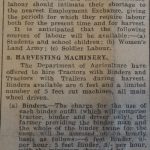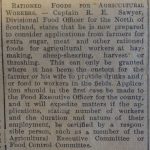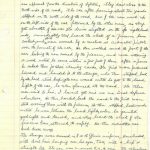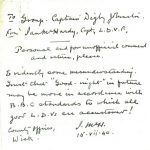After the signing of the armistice between Germany and France the previous Sunday, France officially surrendered at 01:35 on Tuesday 25 June. Meanwhile, the Soviet Union continued its advances in Eastern Europe by occupying Romanian Bessarabia and part of Bukovina. The week ended with German forces invading the British Channel Islands.
 This week a notice appeared in the John O’Groat Journal addressed to “Farmers, Landholders and Crofters in Caithness”, stating that all lands in the county would shortly be surveyed with a view to increasing food production. “All occupiers of land will be expected to plough up at least 50% of their arable land during the ploughing season of 1940-41”, and adding that compulsory orders could be issued “where necessary”. Farmers who were short of labour would be able to call on “(a) students and school children; (b) Women’s Land Army; (c) Soldier Labour”.
This week a notice appeared in the John O’Groat Journal addressed to “Farmers, Landholders and Crofters in Caithness”, stating that all lands in the county would shortly be surveyed with a view to increasing food production. “All occupiers of land will be expected to plough up at least 50% of their arable land during the ploughing season of 1940-41”, and adding that compulsory orders could be issued “where necessary”. Farmers who were short of labour would be able to call on “(a) students and school children; (b) Women’s Land Army; (c) Soldier Labour”.
However, the paper also reported that applications from farmers for “extra sugar, meat and other rationed foods  for agricultural workers at hay-making, sheep-shearing, harvest or threshing” would be considered – but only where “it has been the custom for the farmer or his wife to provide drinks and/ or food to workers in the fields.”
for agricultural workers at hay-making, sheep-shearing, harvest or threshing” would be considered – but only where “it has been the custom for the farmer or his wife to provide drinks and/ or food to workers in the fields.”
Meanwhile, with the threat of a German invasion in everyone’s minds following the fall of France, a curious incident took place early on the morning of 25 June. The witness statement is in the Home Guard papers, and is worth quoting from at length.
Two members of the Local Defence Volunteer force (who would have been unarmed at this stage of the war) were on patrol, walking up the A9 from Lybster to Occumster when they were overtaken by a van. The vehicle stopped some ten yards further on, and as the two LDV men approached it the driver got out, “and immediately they heard the click of a firearm being cocked, and they were covered by a revolver or automatic pistol over the bonnet of the car”. The driver walked towards them, “never uttering a word until he came within a few feet of them. After a pause he asked them for their identity cards.” One of the LDV men handed his over, and while the driver went to read it by the headlights, the other said, “I haven’t got mine, we are Local Defence Volunteers”.
The driver returned the first man’s card, “still covering them with the firearm. He then stepped backwards until he was between the head lights, when he grunted goodnight and turned, and they heard the click of the firearm been returned to safety.” He drove off without another word.
 The statement concludes, “The stranger was dressed in R.A.F. officers’ uniform, bareheaded, with dark hair hanging over his eyes, tall, with a limp or straight leg. The car was a small R.A.F. van. The volunteers at first thought he was a [German] parachutist by his personal appearance and owing to the fact that he did not speak for a considerable time. But they eventually came to the conclusion he was a R.A.F. Officer under the influence of drink.”
The statement concludes, “The stranger was dressed in R.A.F. officers’ uniform, bareheaded, with dark hair hanging over his eyes, tall, with a limp or straight leg. The car was a small R.A.F. van. The volunteers at first thought he was a [German] parachutist by his personal appearance and owing to the fact that he did not speak for a considerable time. But they eventually came to the conclusion he was a R.A.F. Officer under the influence of drink.”
Captain M’Hardy of the LDV forwarded the report to Group Captain Eric Digby Johnston of  RAF Wick, with the following good-humoured note (marked, “personal and for unofficial comment and return”). “Evidently some misunderstanding. Trust that “Good-night” in future may more in accordance with B.B.C. standards to which all good L.D.V.s are accustomed!”
RAF Wick, with the following good-humoured note (marked, “personal and for unofficial comment and return”). “Evidently some misunderstanding. Trust that “Good-night” in future may more in accordance with B.B.C. standards to which all good L.D.V.s are accustomed!”
